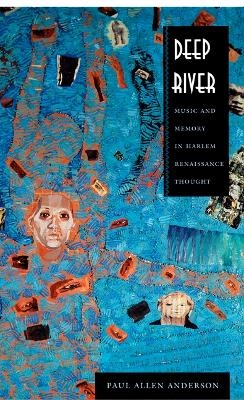
Deep River
Music and Memory in Harlem Renaissance Thought
Seiten
2001
Duke University Press (Verlag)
978-0-8223-2591-8 (ISBN)
Duke University Press (Verlag)
978-0-8223-2591-8 (ISBN)
Focuses on the role of African American folk music in Renaissance aesthetic and political debates about racial performance, social memory, and national identity. This book elucidates how spirituals, African American concert music, the blues, and jazz became symbolic sites of social memory and anticipation in the era of the Harlem Renaissance.
“The American Negro,” Arthur Schomburg wrote in 1925, “must remake his past in order to make his future.” Many Harlem Renaissance figures agreed that reframing the black folk inheritance could play a major role in imagining a new future of racial equality and artistic freedom. In Deep River Paul Allen Anderson focuses on the role of African American folk music in the Renaissance aesthetic and in political debates about racial performance, social memory, and national identity.
Deep River elucidates how spirituals, African American concert music, the blues, and jazz became symbolic sites of social memory and anticipation during the Harlem Renaissance. Anderson traces the roots of this period’s debates about music to the American and European tours of the Fisk Jubilee Singers in the 1870s and to W. E. B. Du Bois’s influential writings at the turn of the century about folk culture and its bearing on racial progress and national identity. He details how musical idioms spoke to contrasting visions of New Negro art, folk authenticity, and modernist cosmopolitanism in the works of Du Bois, Alain Locke, Zora Neale Hurston, Langston Hughes, Jean Toomer, Sterling Brown, Roland Hayes, Paul Robeson, Carl Van Vechten, and others. In addition to revisiting the place of music in the culture wars of the 1920s, Deep River provides fresh perspectives on the aesthetics of race and the politics of music in Popular Front and Swing Era music criticism, African American critical theory, and contemporary musicology.
Deep River offers a sophisticated historical account of American racial ideologies and their function in music criticism and modernist thought. It will interest general readers as well as students of African American studies, American studies, intellectual history, musicology, and literature.
“The American Negro,” Arthur Schomburg wrote in 1925, “must remake his past in order to make his future.” Many Harlem Renaissance figures agreed that reframing the black folk inheritance could play a major role in imagining a new future of racial equality and artistic freedom. In Deep River Paul Allen Anderson focuses on the role of African American folk music in the Renaissance aesthetic and in political debates about racial performance, social memory, and national identity.
Deep River elucidates how spirituals, African American concert music, the blues, and jazz became symbolic sites of social memory and anticipation during the Harlem Renaissance. Anderson traces the roots of this period’s debates about music to the American and European tours of the Fisk Jubilee Singers in the 1870s and to W. E. B. Du Bois’s influential writings at the turn of the century about folk culture and its bearing on racial progress and national identity. He details how musical idioms spoke to contrasting visions of New Negro art, folk authenticity, and modernist cosmopolitanism in the works of Du Bois, Alain Locke, Zora Neale Hurston, Langston Hughes, Jean Toomer, Sterling Brown, Roland Hayes, Paul Robeson, Carl Van Vechten, and others. In addition to revisiting the place of music in the culture wars of the 1920s, Deep River provides fresh perspectives on the aesthetics of race and the politics of music in Popular Front and Swing Era music criticism, African American critical theory, and contemporary musicology.
Deep River offers a sophisticated historical account of American racial ideologies and their function in music criticism and modernist thought. It will interest general readers as well as students of African American studies, American studies, intellectual history, musicology, and literature.
Paul Allen Anderson is Assistant Professor of American Culture and African American Studies at the University of Michigan, Ann Arbor.
Acknowledgments
Introduction
1. “Unvoiced Longings”: Du Bois and the Sorrow Songs
2. Swan Songs and Art Songs: The Spirituals and the “New Negro” in the 1920s
3. “The Twilight of Aestheticism”: Locke on Cosmopolitanism and Musical Evolution
4. “Beneath the Seeming Informality”: Hughes, Hurston, and the Politics of Form
5. Saving Jazz From Its Friends: The Predicament of Jazz Criticism in the Swing Era
Epilogue
Notes
Selected Bibliography
Index
| Erscheint lt. Verlag | 19.7.2001 |
|---|---|
| Reihe/Serie | New Americanists |
| Zusatzinfo | 8 b&w photographs |
| Verlagsort | North Carolina |
| Sprache | englisch |
| Maße | 146 x 235 mm |
| Gewicht | 544 g |
| Themenwelt | Kunst / Musik / Theater ► Musik |
| Sozialwissenschaften ► Ethnologie | |
| Sozialwissenschaften ► Soziologie ► Spezielle Soziologien | |
| ISBN-10 | 0-8223-2591-8 / 0822325918 |
| ISBN-13 | 978-0-8223-2591-8 / 9780822325918 |
| Zustand | Neuware |
| Haben Sie eine Frage zum Produkt? |
Mehr entdecken
aus dem Bereich
aus dem Bereich
eine Einführung
Buch | Softcover (2024)
De Gruyter Oldenbourg (Verlag)
29,95 €


